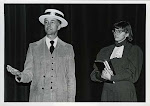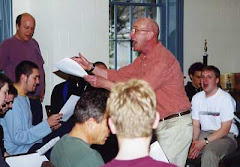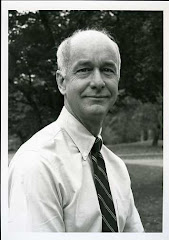If you've found it painful picturing Suerk living the last twenty months of his life in a nursing home, consider some things.
We found a way (the money) to move Suerk to a private room one year ago. A private room would have had space for his books, art and clocks, and some furniture from home. As it was, there was barely room for two folding chairs by his bed. The new room would have been better for him visually, and more comfortable for his visitors to linger. As it was, when a nurse came to tend to him, you had to get physical just to get round one another. A private room might do him (and us) some good. So I thought.
Suerk refused. Wouldn't even consider it. "I love Jim," he said, "And I won't leave him." Jim is the 86 year old WWII vet with a partially amputated leg whom Suerk could have nearly reached out and touched through the curtain had he been able. Jim and Suerk sang together. Like Suerk was, Jim is a radio man. He hates watching TV. He listened to Suerk's. Like Suerk, Jim's a baseball man (Yankees). Sorry Suerk. And like Suerk did have, Jim has an encyclopedic memory. They finished one another's sentences, and lyrics. Rarely but sometimes, the pages in the encyclopedia were smudged. It was important to have Jim when Suerk struggled to remember that it was the "ausen fay" he had requested with his "frim fram sauce." And it was important for Jim to have Suerk to help him remember that he had ordered his "chafafa on the side." Suerk secretly rejoiced for Jim when the Yankees won the World Series last fall. And if that's not love...
We finished the renovation on 872 Hilltop Road last October. Suerk knew I was doing it in order that he might move back with full-time care. I kept him apprised of the work all along. He also knew that when the work was completed he would be asked to make his decision. The concept worried him some. For that I was sorry. But there were no secrets. I wanted this to be a process for him. I wanted him to arrive gradually to the time when he knew it was his decision to return home, or not. In the end he was relieved to stay where he was.
Western Reserve is a modest, low-slung, shabby, simple little nursing home. There's nothing aesthetically pleasing about the place. But there he felt a part of a thriving community. Thriving toward an imminent and not-so-distant ending, maybe, but thriving nonetheless. He did not care how the place looked. "That's for the visitors," he'd say. "I like keeping my eyes closed most of the time anyway." He loved the nurses, the aids and the orderlies -- never recognizing or acknowledging their rank. He knew their husband's, wives', girlfriend's and boyfriend's names. He worked to remember their life stories, and he succeeded in that. He liked teasing them. You can imagine how they returned the love. For them, he was an extraordinary treasure -- one of the few who could really converse with and get to know them. And he was the one resident whose conversation, if it soared over their heads, happened because his vocabulary and thought structure transcended their own -- not because his capacity had diminished or dissolved. The good people who tended to Suerk at Western Reserve valued that and showed him as much.
The point is obvious. His last months were happy months and Suerk was happy where he was. Happy with his roommate. Happy with his people. He thrived there like he did in every other community. He had the same tools of adaptation and agility in life there in the bed as he's had everywhere else he's traveled. He never pitied himself and hated the thought that we might pity him. He never begrudged not hearing from some people. He was humbled, but loved hearing from those who took these last months as the the time to tell him how much he meant to them. He remained deeply occupied living in his last community until the very end. He had few regrets. I believe that he died with a full and happy heart. No pity.
Subscribe to:
Post Comments (Atom)



3 comments:
I was very sad to receive the news today that Paul Suerken had passed on and yet also glad to read the manner of his passing in this blog. If he was at a place of no regret and no pity then he was ready. It's now up to the living to contend with the "now" and all the sadness and thoughts that go with it. He's in that "aeternal now" that is often written about but rarely experienced in this lifetime.
I wish my own personal difficulties and distractions had allowed me to write something to him, to let him know that what I saw and felt from him in the early 80's was the radiance of a genuinely kind person. But I did not know what to say or how to say it, until recently. Somehow I hope he knows that, astride his Vespa or simply smiling at the head of a dining room table, he made a real difference in my life. Even if I was too young to appreciate it then and too caught up in worldly stuff to write it now.
I hope that he is truly free in the inconceivable sense of that word and that all those who mourn him find comfort in the example of his life.
--Benjamin van der Wel, '83
Suek taught me to love Shakespeare; taught me better than any of the university professors I had at Penn. Taught me so much more about life and how to live it.
Carolyn Mackie Appelbe '80
Paul Suerken was the reason I remained at Mercersburg after a tumultuous first year in the mid-1960's. As marching band and concert band director he conducted music and lives both, and his support meant the world to me. I know I speak as well for my late brother (David Ganelin, x71) who had an especially close relationship with him, a melding of minds.
Charles Ganelin '68
Post a Comment